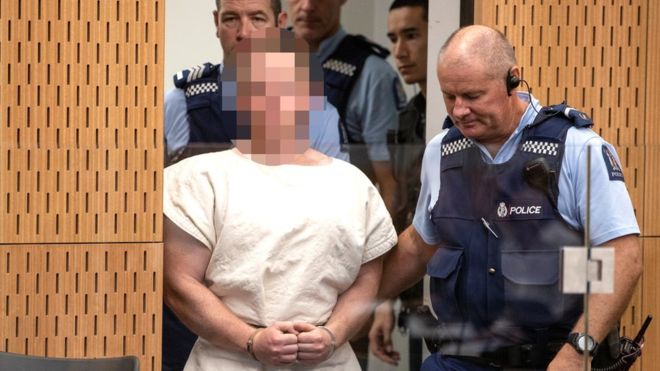The main suspect in the killings of 49 people in shootings at two mosques in New Zealand on Friday has appeared in court on a single murder charge.
Australian Brenton Tarrant, 28, was brought to the dock in a white prison shirt and handcuffs. Further charges are expected to be made against him.
PM Jacinda Ardern said Mr Tarrant had a firearms licence and owned five guns, adding: "Our gun laws will change." Two others are in custody. None of those detained had a criminal record.
Mr Tarrant was described by Australian Prime Minister Scott Morrison as an "extremist, right-wing, violent terrorist".
The suspect, who stood silently during the brief hearing in Christchurch, was remanded in custody without a plea and is due to appear in court again on 5 April.
The court judge ruled that the suspect's face should be pixellated in photographs and filming to preserve his fair trial rights.
Ms Ardern called the attack "an act of terror", and officials are still carrying out the identification of the victims.
'He wanted to continue'
Ms Ardern said the guns used by the attacker appeared to have been modified, and that the suspect's car was full of weapons, suggesting "his intention to continue with his attack".
Speaking at a news conference on Saturday, she said the suspect had obtained a gun licence in November 2017 that allowed him to buy the weapons used in the attack.
"The mere fact... that this individual had acquired a gun licence and acquired weapons of that range, then obviously I think people will be seeking change, and I'm committing to that."
New Zealand's Attorney-General David Parker said the government would look into banning semi-automatic weapons, but that no final decision had been made. Previous attempts to tighten gun laws in a country with a strong gun lobby and culture of hunting have failed.
'A rejection of hate'
Rupert Wingfield-Hayes, BBC News, Christchurch
All day on Saturday the people of Christchurch have been turning out to show their rejection of the hate that inspired Friday's horrific attacks.
In ones and twos and in family groups, people have been coming by the hundred to a makeshift memorial set up on the edge of Hagley Park. Outside the two mosques that were attacked, people have been laying more flowers. Many have left hand-written notes. "This is not New Zealand," one read.
At one point a group of young men started quietly singing a traditional Maori song, their heads bowed, eyes closed. The mayor of Christchurch said the killer had come to the city with hate in his heart, to perform an act of terrorism. But she said he did not represent anything about the city.
Still, there are lots of uncomfortable questions for the authorities here. The man now in custody, Brenton Tarrant, made no secret of his support for white supremacy. He had reportedly been planning the attacks for months. And yet he was not on any police watch list. He did not have any trouble getting a gun licence, nor in buying a collection of high-powered weapons.
Suspect 'not on radar'
The suspect had "travelled around the world with sporadic periods of time spent in New Zealand," Ms Ardern said, without formally identifying him.
She said New Zealand intelligence services had been stepping up investigations into far-right extremists, but added: "The individual charged with murder had not come to the attention of the intelligence community nor the police for extremism."
Before the attacks, social media accounts in the name of Brenton Tarrant were used to post a lengthy, racist document in which the author identified the mosques that were later attacked.
The text is called The Great Replacement, a phrase that originated in France and has become a rallying cry for European anti-immigration extremists. The man said he had began planning an attack after visiting Europe in 2017 and being angered by events there.
The suspect sent the document to 70 people, including to Ms Ardern's generic address, less than 10 minutes before the attack, the New Zealand Herald reports.
Source: BBC





